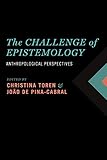The Challenge of Epistemology : Anthropological Perspectives / ed. by Christina Toren, João de Pina-Cabral.
Material type: TextPublisher: New York ; Oxford : Berghahn Books, [2011]Copyright date: ©2011Description: 1 online resource (228 p.)Content type:
TextPublisher: New York ; Oxford : Berghahn Books, [2011]Copyright date: ©2011Description: 1 online resource (228 p.)Content type: - 9780857454355
- 9780857455161
- 301.01 23
- GN33 .C5 2011
- online - DeGruyter
| Item type | Current library | Call number | URL | Status | Notes | Barcode | |
|---|---|---|---|---|---|---|---|
 eBook
eBook
|
Biblioteca "Angelicum" Pont. Univ. S.Tommaso d'Aquino Nuvola online | online - DeGruyter (Browse shelf(Opens below)) | Online access | Not for loan (Accesso limitato) | Accesso per gli utenti autorizzati / Access for authorized users | (dgr)9780857455161 |
Browsing Biblioteca "Angelicum" Pont. Univ. S.Tommaso d'Aquino shelves, Shelving location: Nuvola online Close shelf browser (Hides shelf browser)

|

|

|

|

|

|

|
||
| online - DeGruyter Post-cosmopolitan Cities : Explorations of Urban Coexistence / | online - DeGruyter Women of Two Countries : German-American Women, Women's Rights and Nativism, 1848-1890 / | online - DeGruyter Images of Power and the Power of Images : Control, Ownership, and Public Space / | online - DeGruyter The Challenge of Epistemology : Anthropological Perspectives / | online - DeGruyter Legends of People, Myths of State : Violence, Intolerance, and Political Culture in Sri Lanka and Australia / | online - DeGruyter A History of Oxford Anthropology / | online - DeGruyter An Anthropology of War : Views from the Frontline / |
Frontmatter -- Contents -- Introduction: The Challenge of Epistemology -- Chapter 1 Answering Daimã’s Question: The Ontogeny of an Anthropological Epistemology in Eighteenth-Century Scotland -- Chapter 2 Phenomenological Psychoanalysis: The Epistemology of Ethnographic Field Research -- Chapter 3 Plural Modernity: Changing Modern Institutional Forms—Disciplines and Nation-States -- Chapter 4 Ontography and Alterity: Defining Anthropological Truth -- Chapter 5 Exchanging Skin: Making a Science of the Relation between Bolivip and Barth -- Chapter 6 An Afro-Brazilian Theory of the Creative Process: An Essay in Anthropological Symmetrization -- Chapter 7 Intersubjectivity as Epistemology -- Chapter 8 Can Anthropology Make Valid Generalizations? Feelings of Belonging in the Brazilian Atlantic Forest -- Chapter 9 The All-or-Nothing Syndrome an d the Human Condition -- Chapter 10 Evidence in Socio-cultural Anthropology: Limits and Options for Epistemological Orientations -- Chapter 11 Strange Tales from the Road: A Lesson Learned in an Epistemology for Anthropology -- Chapter 12 Epistemology and Ethics: Perspectives from Africa -- Index
restricted access online access with authorization star
http://purl.org/coar/access_right/c_16ec
Epistemology poses particular problems for anthropologists whose task it is to understand manifold ways of being human. Through their work, anthropologists often encounter people whose ideas concerning the nature and foundations of knowledge are at odds with their own. Going right to the heart of anthropological theory and method, this volume discusses issues that have vexed practicing anthropologists for a long time. The authors are by no means in agreement with one another as to where the answers might lie. Some are primarily concerned with the clarity and theoretical utility of analytical categories across disciplines; others are more inclined to push ethnographic analysis to its limits in an effort to demonstrate what kind of sense it can make. All are aware of the much-wanted differences that good ethnography can make in explaining the human sciences and philosophy. The contributors show a continued commitment to ethnography as a profoundly radical intellectual endeavor that goes to the very roots of inquiry into what it is to be human, and, to anthropology as a comparative project that should be central to any attempt to understand who we are.
Mode of access: Internet via World Wide Web.
In English.
Description based on online resource; title from PDF title page (publisher's Web site, viewed 25. Jun 2024)


